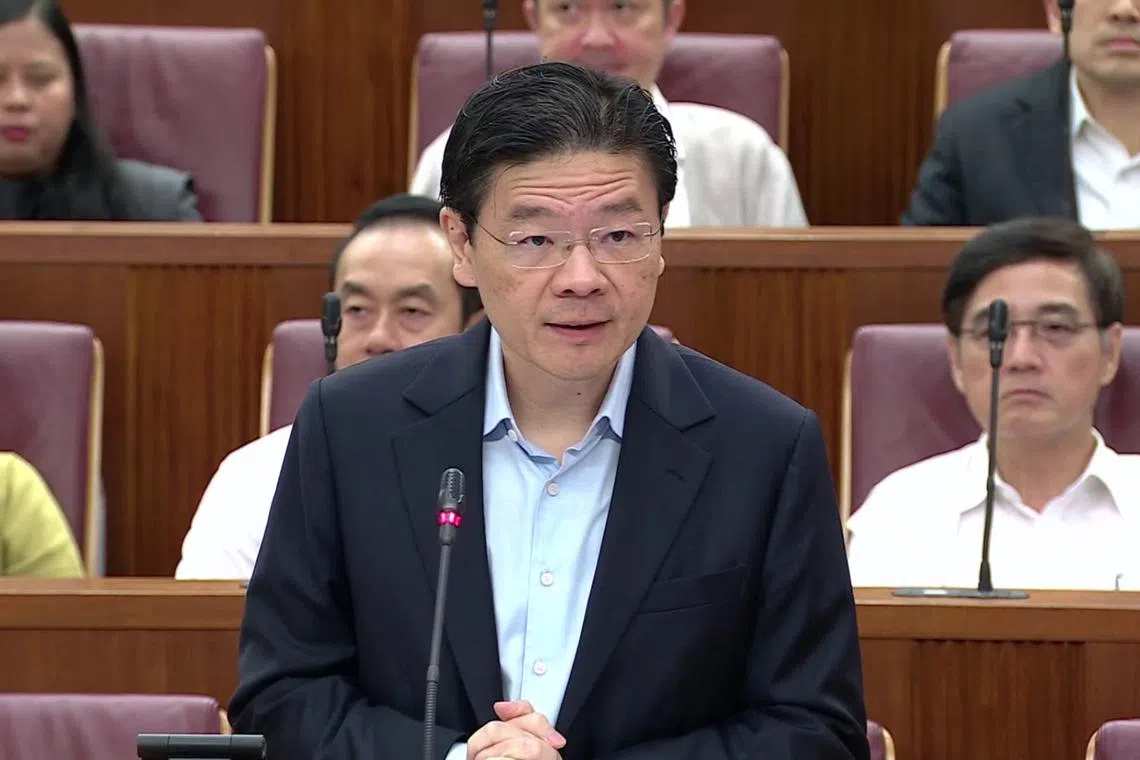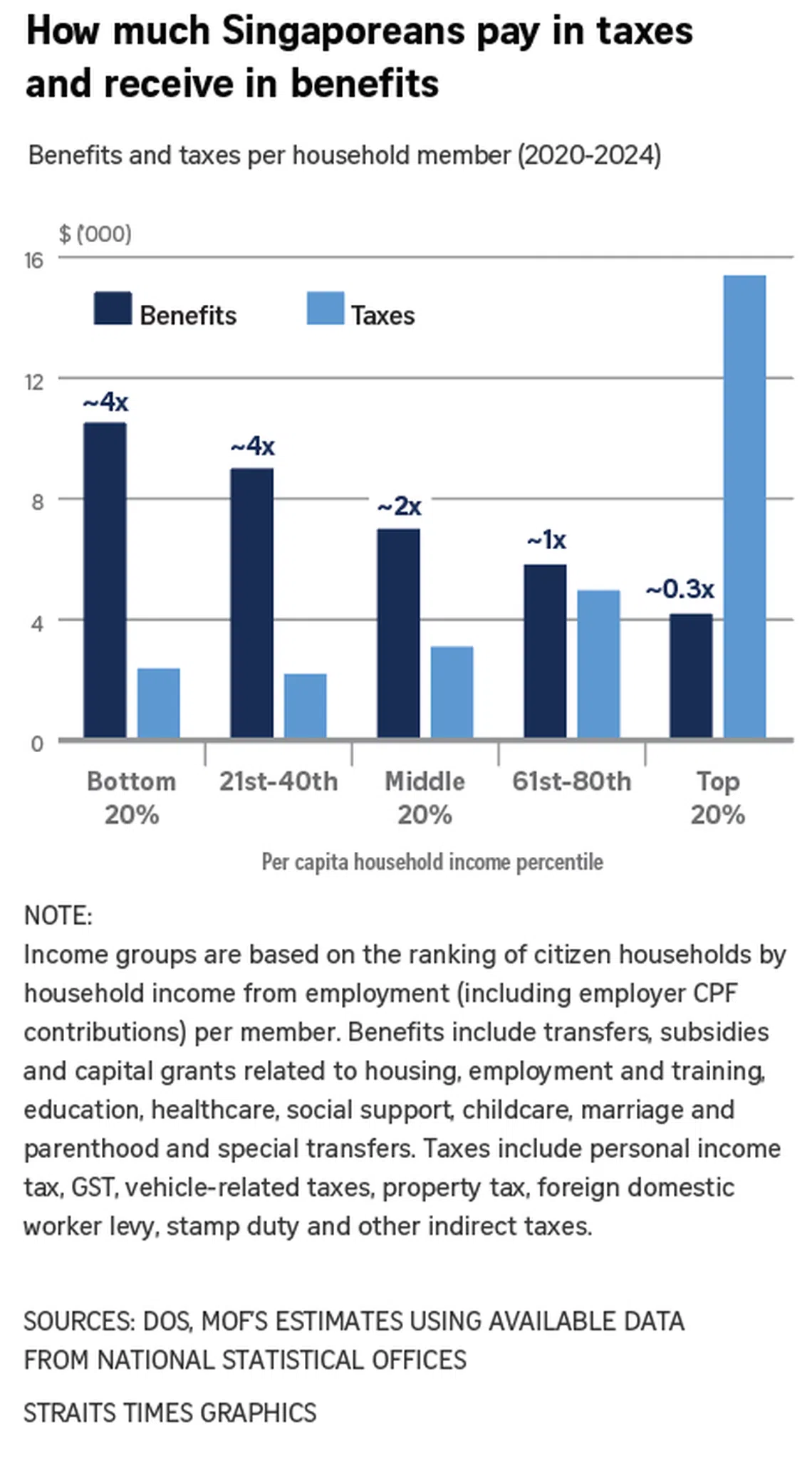This Govt will always uphold fiscal responsibility, says PM Wong
Sign up now: Get ST's newsletters delivered to your inbox

Singapore’s fiscal strength is a vital source of competitive advantage in these turbulent times, which look likely to get worse, says PM Lawrence Wong.
PHOTO: MDDI
SINGAPORE – The PAP Government will never take risks with Singaporeans’ lives and their future – this means ensuring that it keeps public finances healthy year after year and spending within its means, said Prime Minister Lawrence Wong.
PM Wong also cautioned against attempts to portray a healthy surplus as somehow detrimental to Singaporeans as he addressed criticism from opposition MPs about poor budget marksmanship.
“Let’s try not to put a wedge between the Government and the people... A strong fiscal position for Singapore is not at the expense of Singaporeans,” he said. “In fact, it benefits Singaporeans in so many ways, because we are able to invest more in Singaporeans.”
In an hour-long speech wrapping up the Budget debate on Feb 28, he also responded to the opposition’s suggestion
Singapore is in a strong fiscal position today precisely because it took the necessary steps early in this term of government to raise revenues ahead of expected structural spending needs as the population ages, said PM Wong.
While the Republic was fighting the Covid-19 pandemic, it could already foresee spending needs going up on the horizon.
“This was 2020, 2021 – we had no way of knowing when the pandemic would end, how the virus would mutate, how many more new waves of infection would we face, how many more restrictions we have to impose, and how much deeper a fiscal hole we would end up with,” PM Wong said.
The authorities made the decision to proceed with the GST increase in Budget 2022, accompanied by enhancements to a package
“We must ask ourselves, do we want short-term populism or long-term stability?” PM Wong asked. “Do we want to kick the can down the road or take the hard but necessary decisions?”
With the GST increase in place, the Government has the additional revenues – mostly from those who are better off, foreigners and tourists – that it needs to improve healthcare infrastructure and take better care of seniors, he said.
Were it not for the GST hike, and unexpected upsides in corporate income tax collections, FY2024 would have ended in deficit, as would projections for FY2025, he added.
“That would have meant less funding for essential services, less support for our seniors and fewer resources to invest in our future,” he said.
“Basically, Singapore and Singaporeans would have ended up in a much weaker position.”
PM Wong refuted Leader of the Opposition and Workers’ Party (WP) chief Pritam Singh’s proposition that the GST hike had “turbocharged” inflation.
As Singapore is a small and open economy, inflation was driven primarily by global factors, such as war and supply chain disruptions, said the Prime Minister.
In the two years when GST was raised, price increases actually moderated, from 6.1 per cent in 2022 to 4.8 per cent in 2023 and 2.4 per cent in 2024, he pointed out.
He noted that in most countries, poor budget marksmanship refers to when governments severely overestimate revenue collections and underestimate expenditures.
This results in unfunded promises that a country cannot keep, because there is not enough money. Alternatively, it borrows to meet these commitments, thereby leaving a growing burden for the next generation.
This is not the case in Singapore, as the Republic practises responsible and prudent budgeting, PM Wong said.
Earlier in the debate, Mr Singh had called the Government’s fiscal projections “so unpredictable, but somehow always so healthy when elections have to be called”.
This point was echoed by Progress Singapore Party (PSP) Non-Constituency MP Leong Mun Wai, who said that “so much pain” had been inflicted on Singaporeans by the decision to raise GST in 2023 and 2024.
PM Wong said that, ultimately, it was not a matter of marksmanship, but a question of right or wrong fiscal principles.
“The WP and the PSP may think that we are being overly cautious in our projections, but this Government will never take risks with Singaporeans’ lives and future,” he said.
This includes raising revenues should new spending needs arise, he added.
On the charge by opposition MPs that the Government had been relying on temporary measures such as vouchers to deal with cost pressures instead of making structural reforms, PM Wong said that cost-of-living support and the SG60 package
A far larger part of government spending is in structural programmes such as SkillsFuture to empower Singaporeans through skills and job training, he said.
“This will ensure Singaporeans do not just receive help, but are able to stand on their own feet and seize better opportunities for themselves and thrive in a rapidly changing world,” he said.
Objectively speaking, this has helped Singaporean households across different income levels achieve higher real income growth in the past decade than countries like the United States and Japan, he added.
For instance, households in the 20th percentile here saw their per-member household wages rise 3.6 per cent per annum between 2013 and 2023, compared with 2.1 per cent in the US and minus 1.6 per cent in Japan.
Singapore’s fiscal approach has also stood it in good stead – while many countries use their tax revenues to service interest payments, the Republic instead receives an annual boost from its investment returns.
“Countries that have this luxury of investment returns are the ones that are endowed with oil and gas or some other natural resources – they have been blessed by the heavens with these endowments,” PM Wong said.
‘We have nothing, and yet we are in this position. It is truly unique, and it is a Singapore miracle.”
Singapore’s fiscal strength is a vital source of competitive advantage in these turbulent times, which look likely to get worse, said PM Wong.
He flagged the ongoing wars in Europe and the Middle East, and the possibility of conflict in Asia.
Today’s environment means global responses to these threats will sadly not be as well coordinated or effective as before, he added.
“But in Singapore, we know that if such shocks were to arise, we have the ability to respond swiftly to them, like we did during Covid-19,” he said.
“Our reserves and our fiscal strength will enable us to protect Singaporeans when it matters, and to turn adversity into opportunity.”
In a Facebook post in the evening, Senior Minister Lee Hsien Loong said Singapore must continue to spend prudently, so that it can tackle and recover from future challenges swiftly, as it did with Covid-19.
Reflecting on SG60 – the country’s 60th year of independence – SM Lee said the country’s strong fiscal footing has been built through the careful stewardship of the earlier generations. He said: “It gives us confidence to move forward sustainably, so that future generations can enjoy the fruits of Singapore’s progress.”
PM Wong said the Government’s approach has also achieved outcomes that reflect Singapore’s values as a society – one that is fair, prudent and progressive, where the better off contribute more to lift up those with less.
For instance, the bottom quintile of households receives $4 in benefits for every dollar of tax paid, while the top quintile of income earners receives 30 cents.
“There is no fiscal system in the world that can deliver perfect precision and equity. But I think we have found an approach in Singapore that works for us,” he said. “It’s not perfect, but we continue to make it better.”

At the end of the day, PM Wong said, Singaporeans will decide whether they prefer a government that underestimates needs and spends more from the reserves, leaving the country weaker, or one that steadfastly upholds fiscal responsibility and discipline so that current and future generations have the resources to handle unexpected challenges.
“We will continue to do our best to convince Singaporeans that ours is the right approach. It has served us well these last 60 years, and it will continue to keep Singapore on the right track in the years ahead,” he said.
Correction note: In an earlier version of the story, we said that wages for the bottom 20 per cent of households here rose 3.6 per cent per annum between 2013 and 2023. This is incorrect. The 3.6 per cent figure refers to the per-member employment income growth for households at the 20th percentile. We are sorry for the error.
Wong Pei Ting is a correspondent at The Straits Times. She covers politics and social affairs.


